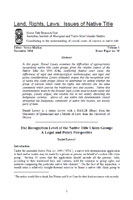The recognition level of the native title claim group: A legal and policy perspective
Under the amended Native Title Act 1993 (NTA), a Native Title determination application to land and/or waters may be made by a person or persons on behalf of a Native Title claim group. Section 61 states that the application should include all the persons “who, according to their traditional laws and customs, hold the common or group rights and interests comprising the particular Native Title claimed.” On the face of this injunction, it would seem a relatively straight-forward exercise to frame a Native Title claim group to achieve the recognition of their Native Title under the NTA. All that is necessary, as Peter Sutton says, is for a line “to be drawn around the claimant group.”
Where this line is placed is very much driven by the relationship between the requirements of the relevant legislation and the results brought forward by the anthropological and legal team assisting the claimants (Sutton, 1995). Yet this relationship between the ‘requirements’ and ‘results’ in the Native Title process is becoming increasingly complex. This is because, firstly, the NTA is largely silent on the other requirements of a properly constituted Native Title claim group. In Risk v Native Title Registrar, O’Loughlin J had to reach deep to “the philosophy that is to be found in the table to s 61” to disqualify a small family-based sub-group as a properly constituted claim group. Secondly, a chain of Federal Court judgments at first instance says that other sub-groups are likewise not entitled to recognition at that level are disregarded or distinguished in other determinations. A conflict of authority may be developing, and if not already conflicted, the law is in need of clarification. The third reason is the gap that is widening between the legal and anthropological methodologies in the Native Title claim process. This was recently exposed, at its nakedest, in the case of Jango (No 7).
The purpose of this article is to examine each of these reasons and to argue for a potential resolution of the issues based not merely on legal or doctrinal grounds but on public policy considerations. A determination of Native Title under the NTA, it is argued, should strengthen the community of Native Title holders, not weaken it. To this end, if justified on the facts, then recognition of Native Title should be to the Indigenous community that ultimately sources the traditional laws and customs.
